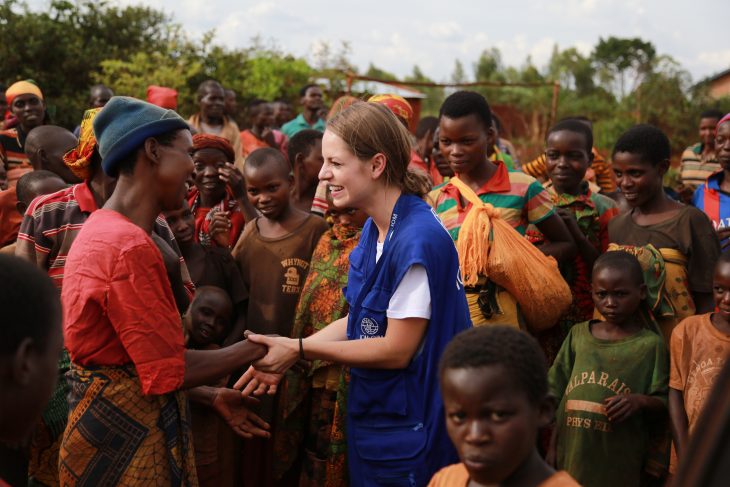The French and international and global studies double major works with the International Organization for Migration in Burundi, a U.N. agency that supports migrants of all kinds. In the face of COVID-19, her duties have shifted to crisis communication and response in the East African nation.

Amber Christino ’10 describes the facts on the ground in Burundi with calm but urgent clarity.
The East African nation’s fifth reported case of COVID-19 came last week, including a first case of local transmission. There are only a limited number of ventilators for more than 11 million people. Burundi’s population density (around 1,000 people per square mile) and large migrant population traveling across its borders for work mean COVID-19 poses a grave threat. Already, more than 100,000 residents live displaced by natural disasters like floods and landslides.
Those facts make her latest role with the International Organization for Migration, the branch of the United Nations focused on migrants and communities where they settle, vital to protecting the lives of Burundians. She spends her days working remotely from her home in Paris, crafting health messaging and working with other agencies to disseminate COVID-19 information and prepare U.N. workers and the general population to respond to the disease.
“We’re trying to get the country through this time with the least amount of transmission as possible. We have to do our part in that,” Christino said.
 Without health information, without education of and protection for the nation’s migrants and border populations, and coordination with neighboring countries like Tanzania and Rwanda, COVID-19 could run rampant through cities and villages.
Without health information, without education of and protection for the nation’s migrants and border populations, and coordination with neighboring countries like Tanzania and Rwanda, COVID-19 could run rampant through cities and villages.
“The COVID-19 outbreak is fast becoming a complex crisis for migrants and displaced populations as well as the health systems in East Africa – particularly in Burundi,” Christino said. “Migrants and border communities in this region depend heavily on being able to migrate or cross borders for work to survive and support their families back home, making the economic impact of this pandemic even more dire for them.”
For the past few years, Christino has worked for the IOM in Burundi to support migrants of any kind — displaced by scarcity, natural disasters, labor migration and even human trafficking — and their communities. At Elon, Christino majored in French and International and Global Studies, and Burundi is a French-speaking country. She pursued her graduate degree in France after studying there as an undergraduate. She recently gained her French citizenship.
At first, as an IOM intern, she helped plan projects on the ground in Burundi. Now, she coordinates communication about those projects’ outcomes — visiting and reporting from the business startups and restaurants helping communities thrive — to member nations. She calls it the best job ever.
But in the face of COVID-19, her role — like so many others — has shifted.
“We’re now focused on crisis communication around health and mental health and sensitizing colleagues and the Burundi population as a whole to information about COVID-19,” Christino said.

The 180 IOM colleagues working in and for Burundi are coordinating with the country’s ministry of health to implement screening for those entering the country and living along its borders. They are working to secure personal protective equipment for border agents. Messaging campaigns have begun: how to prevent the spread of infection, how to remain healthy, how to care for people and coordinate with health officials. IOM agents are developing and disseminating information materials from UNICEF. The IOM is supporting a national crisis hotline in Burundi, training operators to be able to answer questions from the population.
“A lot will be done in these initial stages of fighting against the disease that will have a significant impact” in reducing the spread of COVID-19, she said.
From Paris, Christino is supporting the mental health of her colleagues, compiling and distributing information about psychological wellbeing and checking in with them in scheduled weekly sessions. She takes the information she shares to heart. Working remotely, her days are stretched thinner. There are few waking hours when she doesn’t have work that needs to be done: a phone call (or two, or three) to make, or information she needs to get to a coworker or another agency.
“There’s a high demand for information about COVID-19, and so it’s really important to get that information out to our colleagues and the general public,” Christino said. “We’re here responding and we’re a key player in the fight against COVID-19.”
About this series: The Elon Alumni in Action series explores the stories of university graduates who are doing important and uplifting work as the world faces the COVID-19 pandemic.


